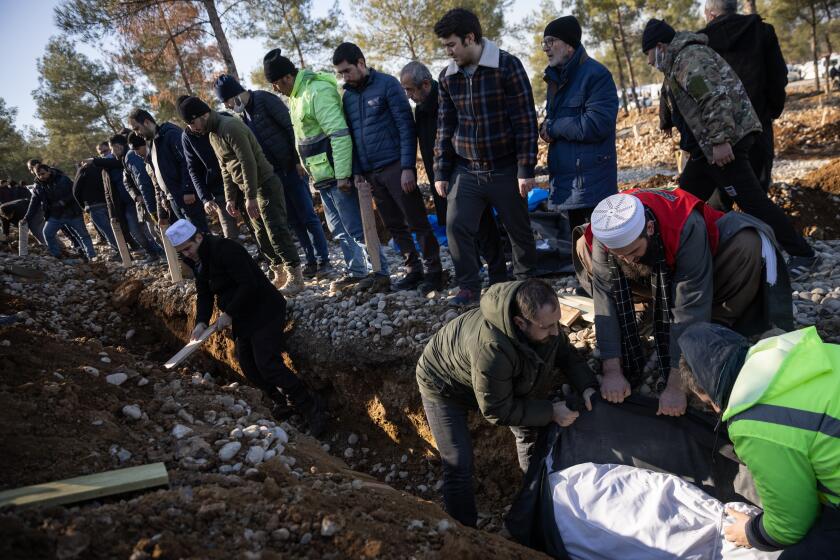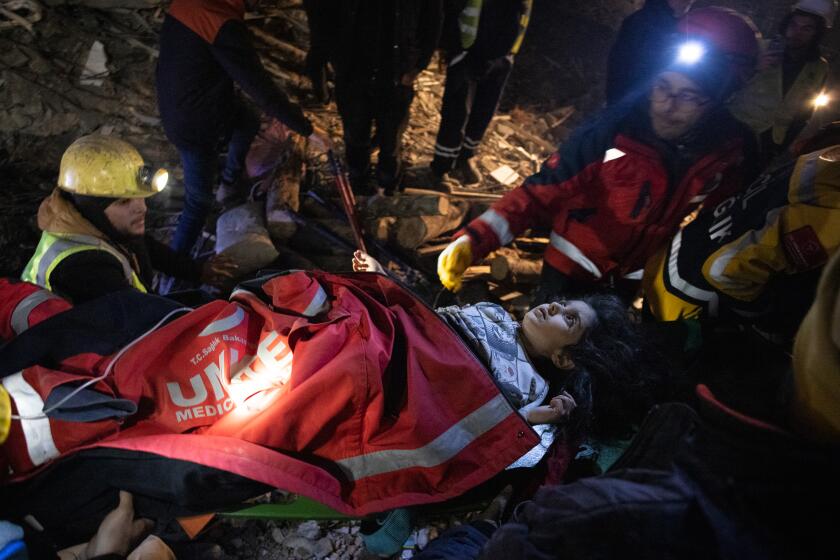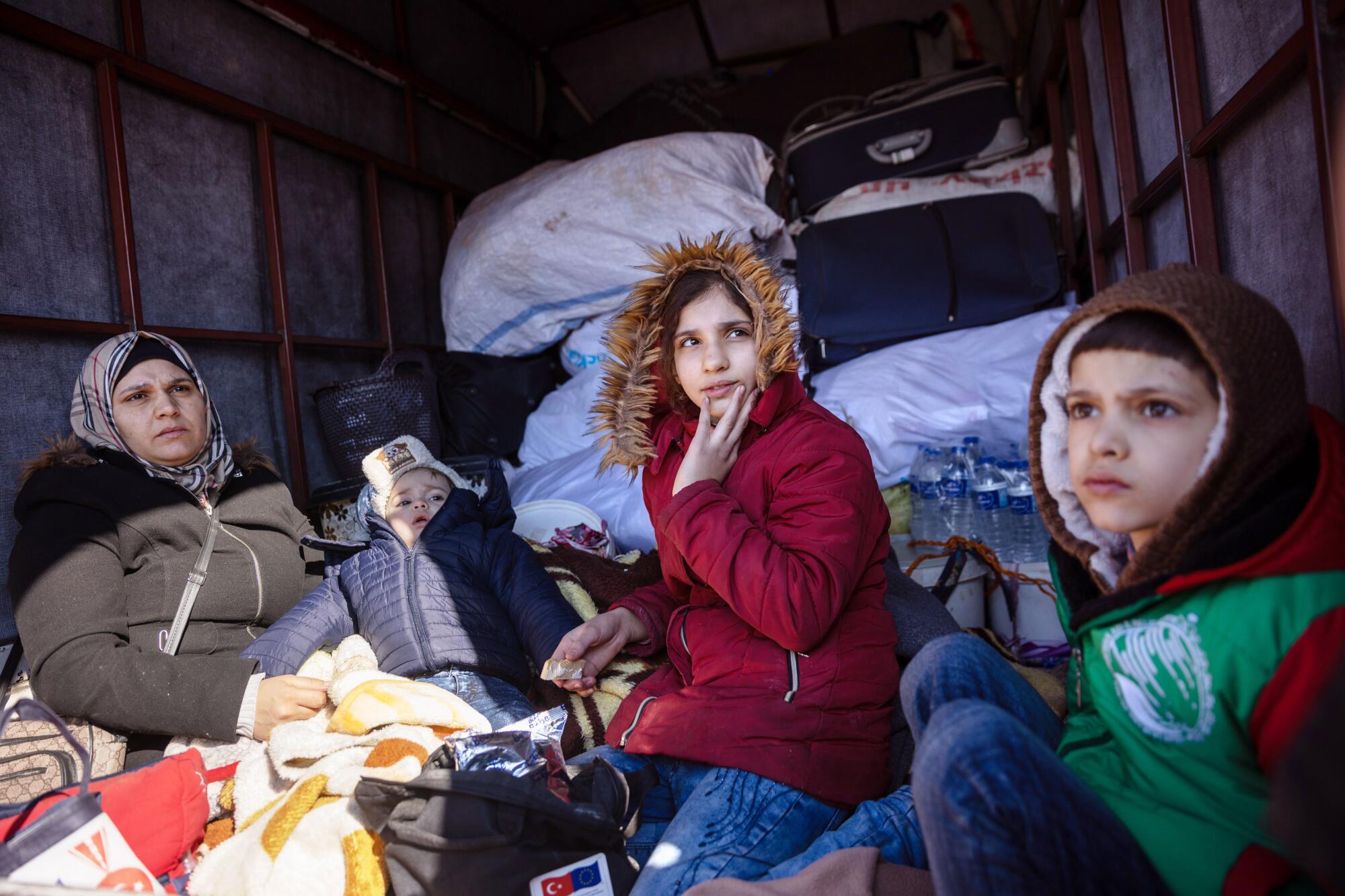
- Share via
KILIS, Turkey — It was on the third day after the devastating earthquake demolished his home and almost killed him and his family that Basel, a 31-year-old Syrian refugee living in Turkey, was able to find an empty plot of land to pitch a tent as a temporary shelter for his family.
But the respite didn’t last.
“Turkish people in the area came and told us they didn’t want us here — that we were to blame for the earthquake and that we weren’t welcome to stay,” said Basel, who gave only his first name to avoid harassment. “They started breaking up the tent, shouting at us until we left.”
He and his family were the victims of a growing wave of resentment against the more than 3.6 million Syrians who have fled their homeland during its ongoing, 12-year-old civil war and settled across the border in Turkey, which hosts more Syrian refugees than any other country.
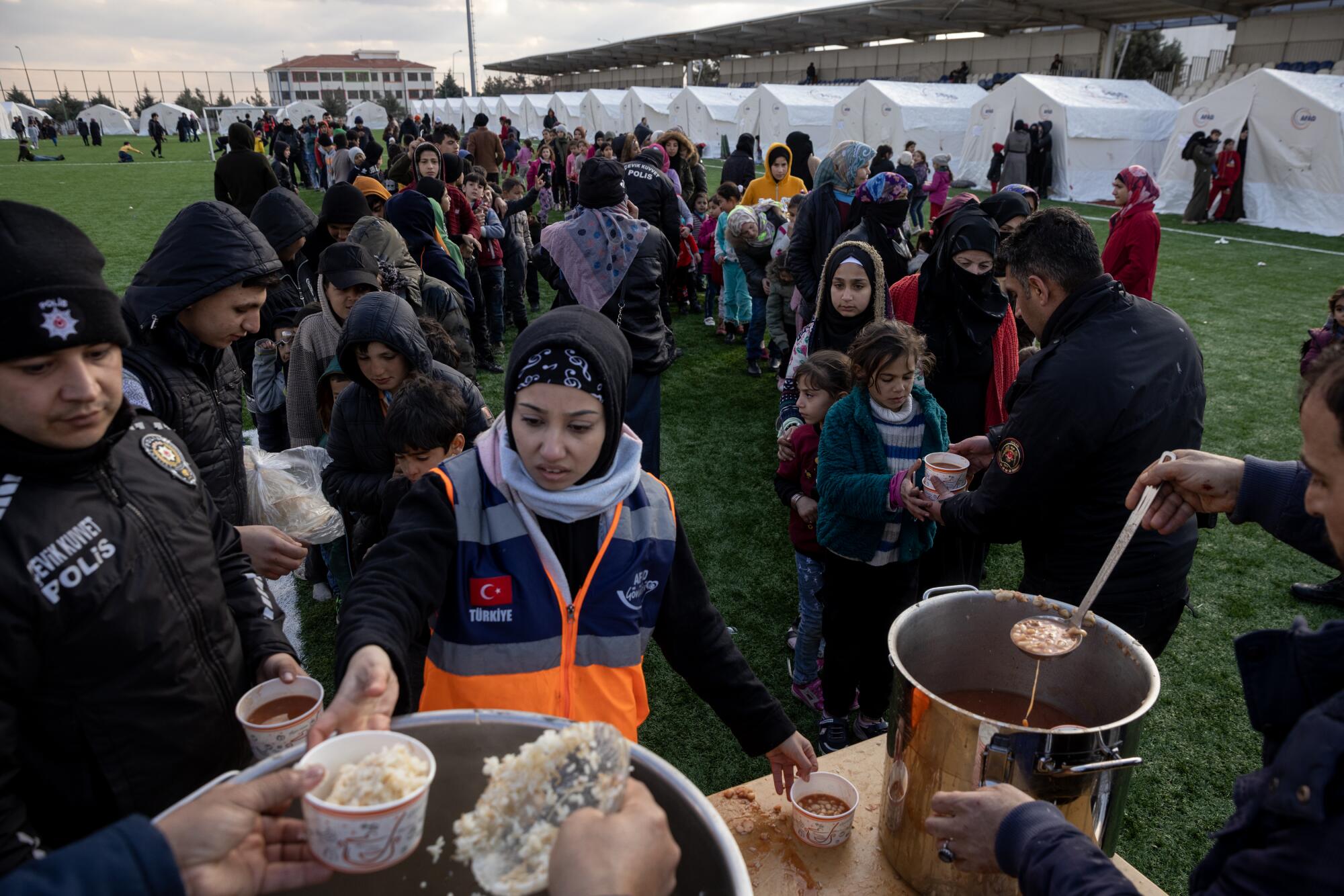
More than 1.6 million of them live in areas hit hard by the magnitude 7.8 earthquake that shook southern Turkey and northern Syria last week. As the death toll climbs past 40,000 and millions face homelessness in what the World Health Organization calls the region’s worst natural disaster in a century, anti-refugee sentiment in Turkey has spiked, driven by politicians hoping to capitalize on public hostility before general elections meant to be held in May.
In recent days, with people’s grief morphing to fury, Syrians have become the target of a misinformation campaign accusing them of looting destroyed homes and stealing aid or blaming them as the reason for the cataclysm hitting Turkey.
The main driver of the campaign, observers say, is Umit Ozdag, a far-right politician who has long pushed to expel Syrians from the country. In the aftermath of the earthquake, he has pushed vitriol-filled messages on social media characterizing their presence as an insidious threat to national security and organized marches to expel Syrians from shelters. Meanwhile, anti-refugee slogans such as “Syrians are no longer welcome” are proliferating on billboards, in conversations and on television talk shows and social media.
The result is escalating harassment against refugees across the country.
In the port city of Mersin, Syrians at a shelter set up in a girls’ dormitory were kicked out to make way for Turkish citizens; witnesses said they were bused to the city of Adana, 40 miles away, and dumped on the street. Authorities in Mugla province warned refugees that they would be given no assistance and that they should seek help in other provinces. Even Syrians trying to help in rescues of quake survivors have been assaulted.
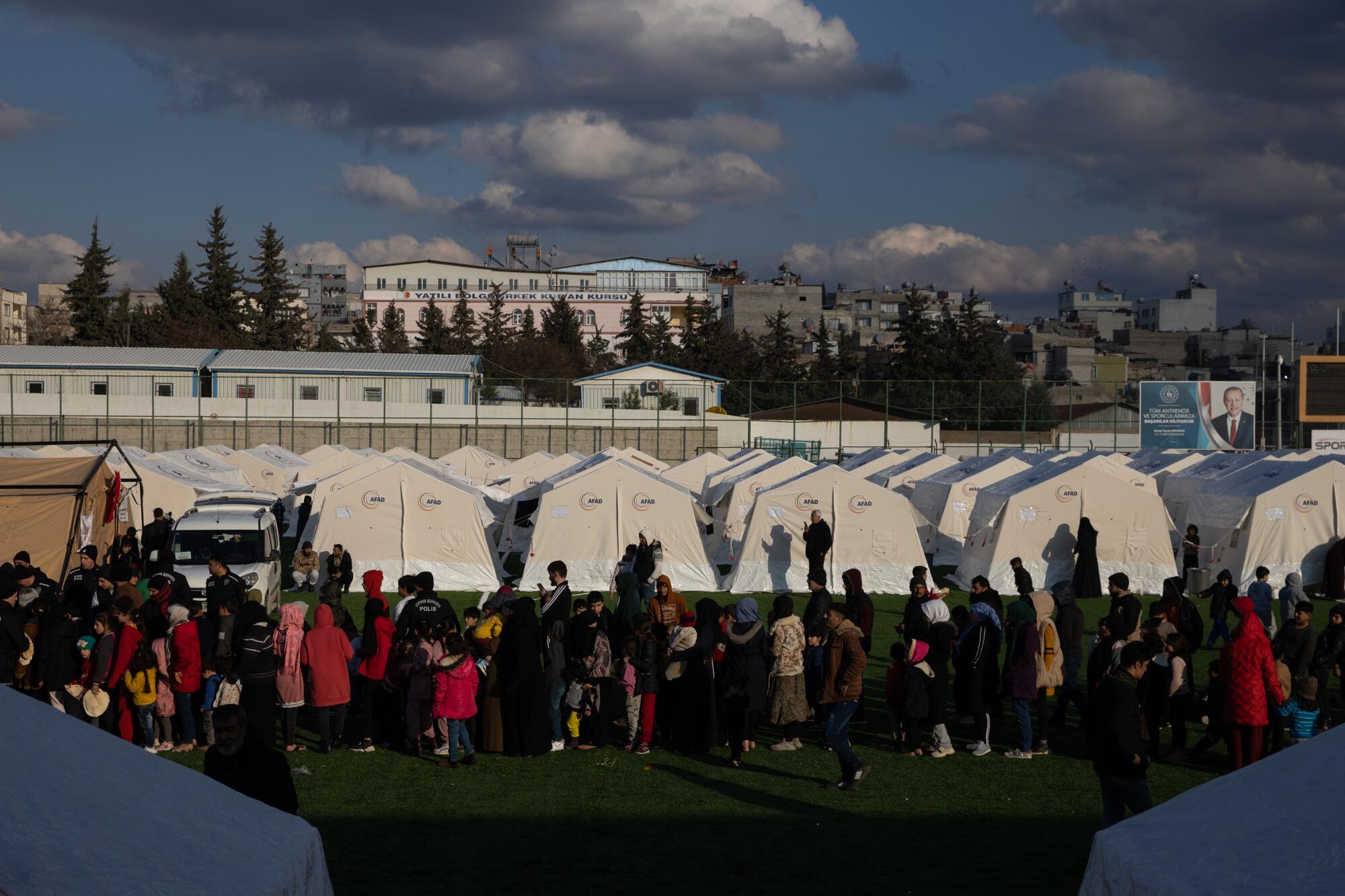
That’s what happened to Usama and his friends in Antakya, one of the hardest-hit cities. On Friday, they were transporting the body of a friend they had recovered from the wreckage and another friend’s electric bicycle when they stopped to get soup at a charity street kitchen.
Volunteers asked them where they were from, and called the police when they said they were Syrians. Before officers had a chance to investigate, a crowd formed around them, with half trying to beat them up while the other half tried to protect them, said Usama, who gave only his first name for fear of reprisals. Police finally came, put them in handcuffs and took them away; they were released hours later.
“People are hurting, and you can’t blame them. And of course someone stealing is not an easy matter in this time, but still, I never felt this level of racism before,” Usama said.
Excavators dig out 200-foot trenches in southern Turkey to bury the bodies of earthquake victims. The death toll rises to more than 20,000.
Many Syrians take pains to point out that authorities have provided services for them and that they’ve received support from Turkish friends and colleagues.
“My employer gave us our salary without delay and even sent us heating supplies when we were in the shelter,” said Mustafa, a 31-year-old janitor here in Kilis, who also declined to give his last name.
But few dispute that anti-Syrian sentiment has been a growing concern in the country for some years. When civil war erupted in Syria in 2011, Turkey became the primary destination for those fleeing the violence. Accommodating them became a central policy of Turkish President Recep Tayyip Erdogan’s government, which has spent $40 billion to house the refugees and offer them access to employment, education and healthcare.
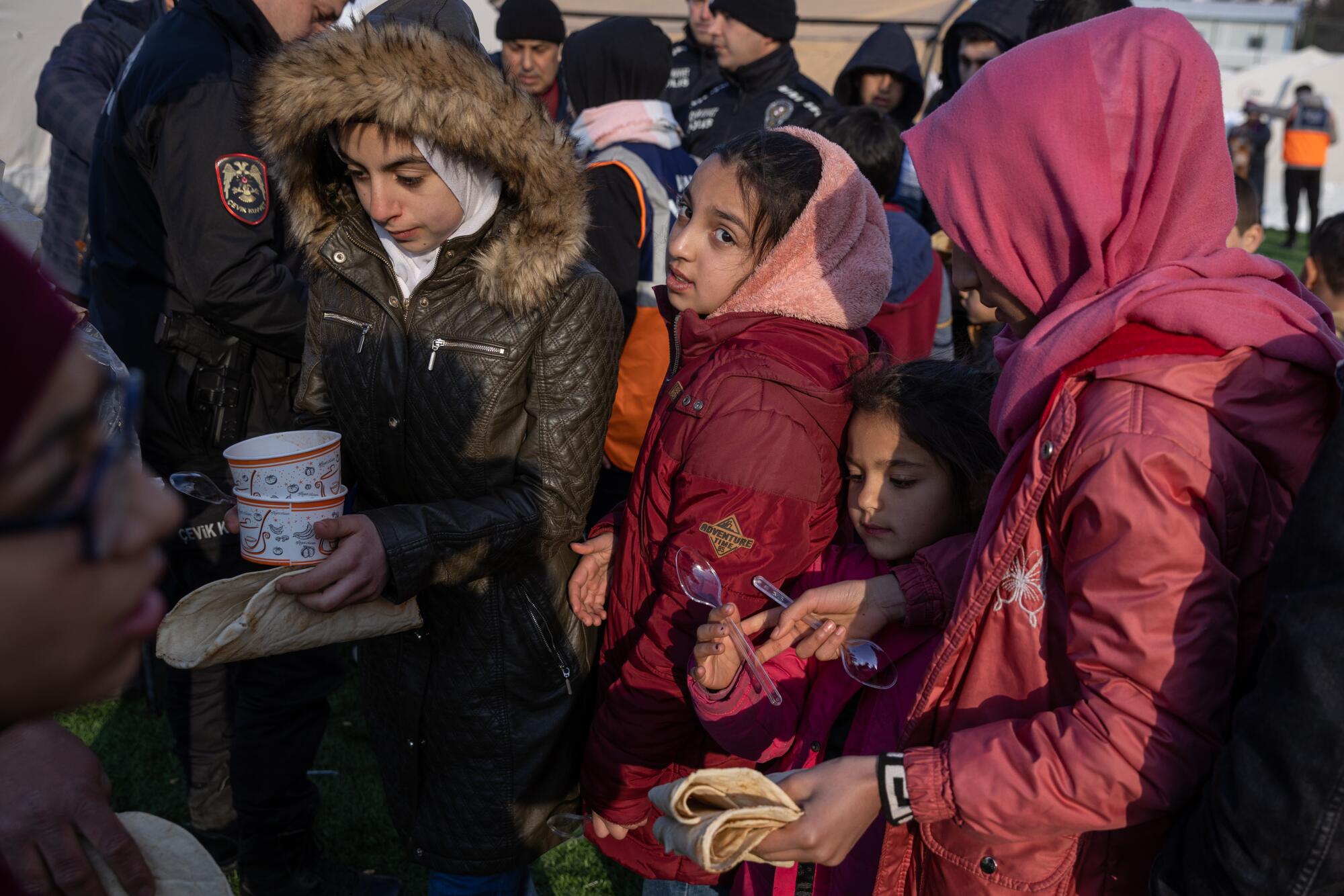
For most Syrians, Turkey was supposed to be a temporary stop, either as a way station on the road to asylum in Europe or a place to wait until the situation at home improved enough for them to return. But with European measures to restrict migration, and with the conflict stuck in a stalemate, many have stayed on.
As the Turkish economy slumped badly in recent years, the refugee issue became a major political battleground, with the opposition seeing it as a way to topple the long-serving Erdogan.
As elections near, the dominant message of the three leading opposition parties is that of “sending Syrians back,” said Begum Basdas, a human rights and migration researcher at the Center for Fundamental Rights at the Hertie School in Berlin. She added that, long before the Feb. 6 earthquake, people were “totally frustrated” with the government’s inability to bring about a durable solution.
The refugees themselves became a convenient scapegoat, Basdas said — “the classic scenario of not actually targeting authorities but those who are vulnerable because they’re easier targets.”
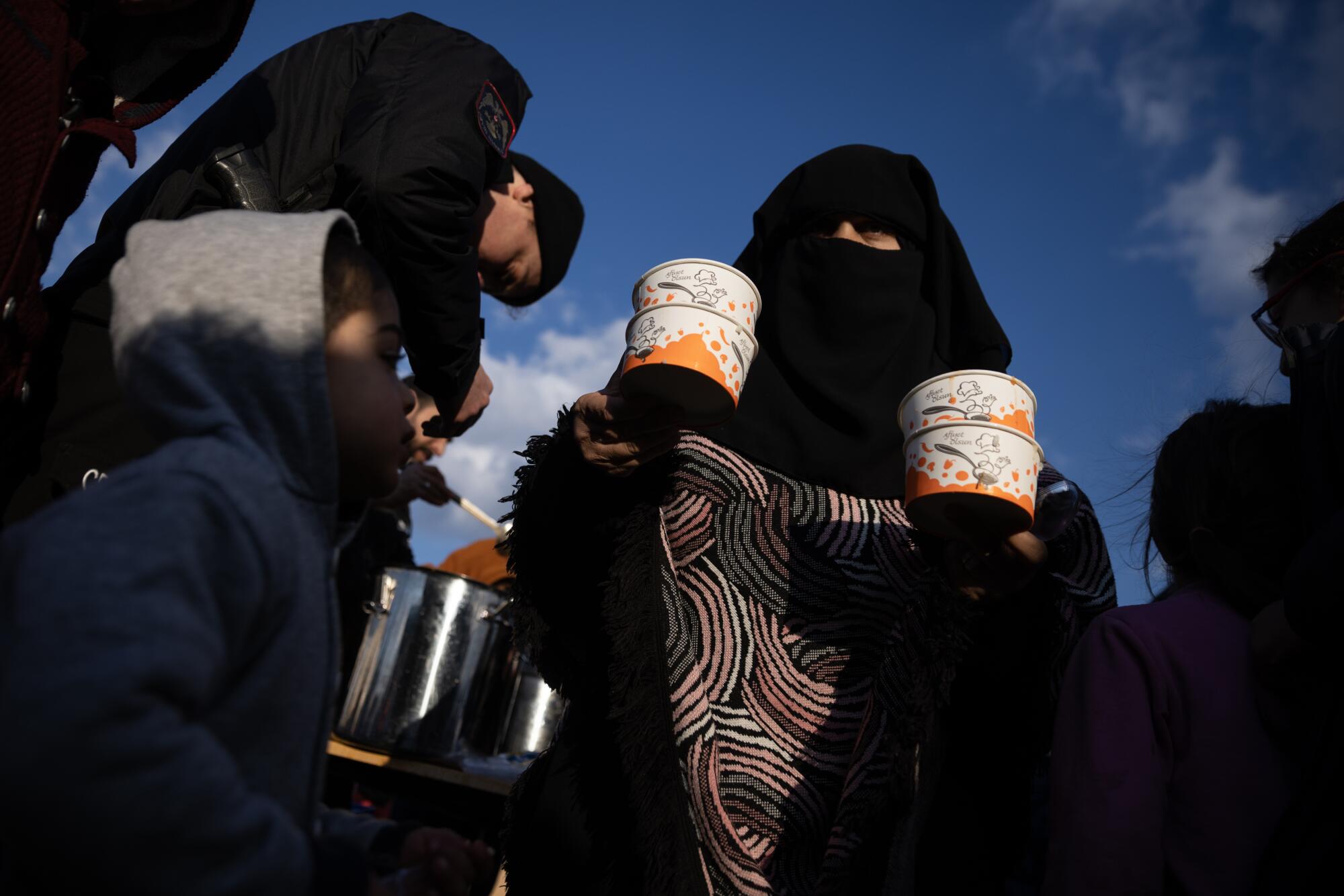
Government regulations meant to restrict Syrians’ movement around Turkey are compounding the community’s problems. Syrians are normally prohibited from leaving the cities they’re registered in without permission from provincial authorities. Although that injunction has mostly been lifted because of the quake, Istanbul remains off limits, removing an important option for the many Syrians fleeing the quake zone, said Taha Ghazi, an Istanbul-based refugee advocate who is Syrian but holds Turkish citizenship.
“Istanbul has the highest percentage of relatives” of Syrian refugees, he said. “So what’s the use? What did the Syrian refugee benefit from allowing him to go to another province?”
The government has also blocked refugees from going into Syria’s Turkish-controlled northern territories and allowed only Syrian corpses, certified by Turkish hospitals and issued an accompanying permit signed by the regional governor, to be transported across the border.
“The permit, it took us two days to get it,” said Samer, a 32-year-old Syrian refugee from war-torn Aleppo who was delivering the bodies of two children — one of them 5 years old — to their relatives near the Bab al Hawa border crossing.
In the days since the magnitude 7.8 earthquake struck Turkey, search-and-rescue teams, including one from Los Angeles County, have been a ubiquitous presence.
Others are grappling with impossible choices, such as Samar Bawaba, who sat with her six children in the back of a truck among burlap bags of rice and other supplies.
Their house in Kahramanmaras, close to the epicenter of the quake, was now rubble, she said, and her husband had been deported three months before by Turkish authorities. With nowhere to turn, the family wanted to go back to Syria, but doing so would mean giving up their Turkish temporary settlement permit; without it they wouldn’t be able to cross back into Turkey.
“I have nothing here. What am I going to do? I can’t stay here in this truck or in a tent,” she said. “I know going back to Syria isn’t easy, but what other solution is there?”
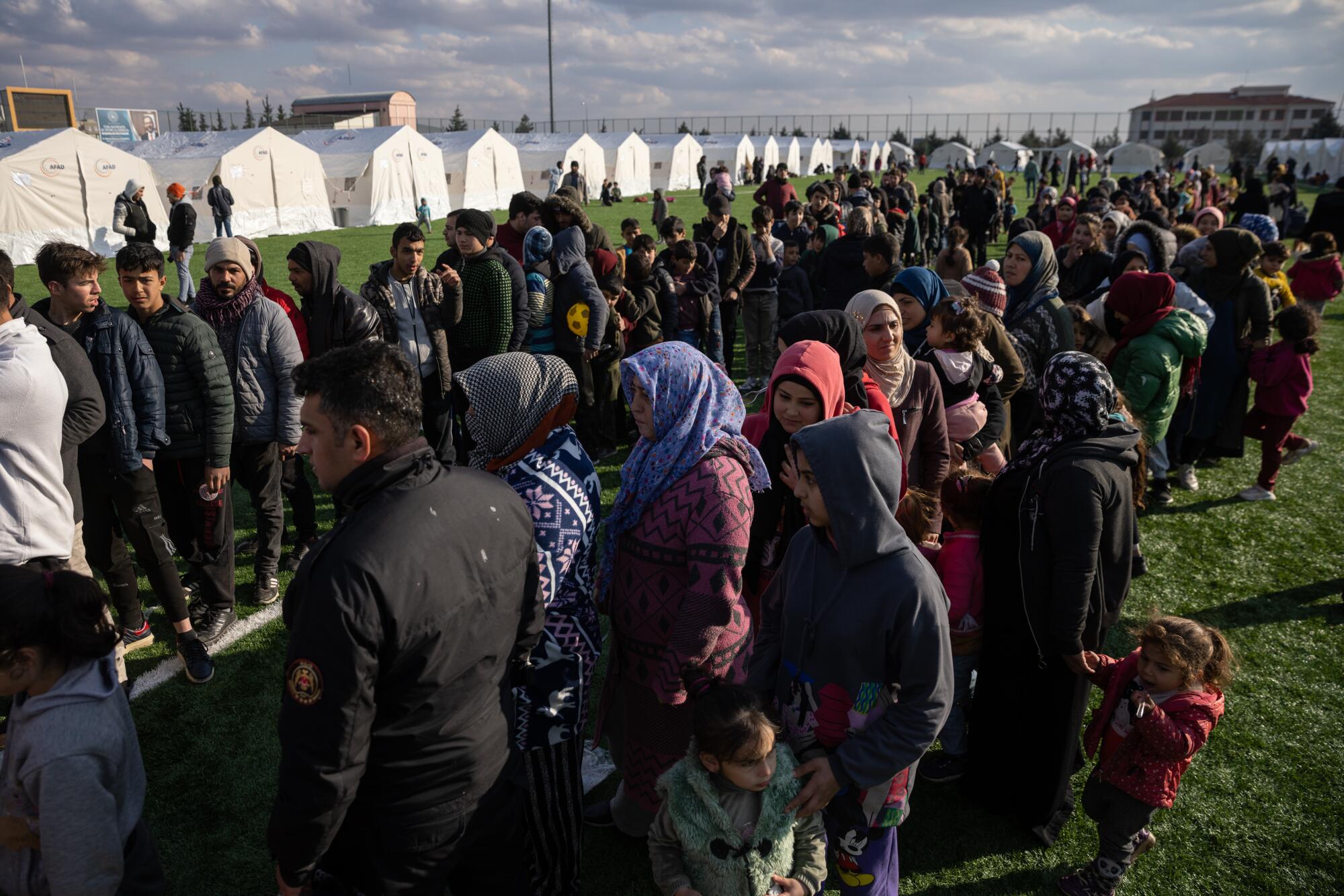
Erdogan has repeatedly vowed that his government would begin rebuilding quickly and pay up to one year of rent for those who do not wish to remain in tents. But there’s no clarity if that would include Syrians, Basdas said.
“Will the state and aid organizations provide sustainable housing to all people affected by the earthquake without discrimination? There’s no sustainable solution for anybody. How do we manage internally displaced people in the long term?” she said.
“This affects everyone, but in these situations, people who are already extremely vulnerable, whether that’s children, women, LGBTQ, refugees or migrants” are even more at risk, Basdas said.
Breaking News
Get breaking news, investigations, analysis and more signature journalism from the Los Angeles Times in your inbox.
You may occasionally receive promotional content from the Los Angeles Times.
Even in death, Syrians may also be forgotten, warns Ghazi, the Istanbul-based refugee advocate. Undocumented refugees, who make up a significant portion of the Syrians in Turkey, do not get recorded in official casualty figures, experts say.
“The most affected areas that were struck are poor neighborhoods with older buildings, and those tend to be the ones with refugees,” Ghazi said.
“I fear that the highest percentage of deaths will be among Syrians.”
More to Read
Sign up for Essential California
The most important California stories and recommendations in your inbox every morning.
You may occasionally receive promotional content from the Los Angeles Times.
